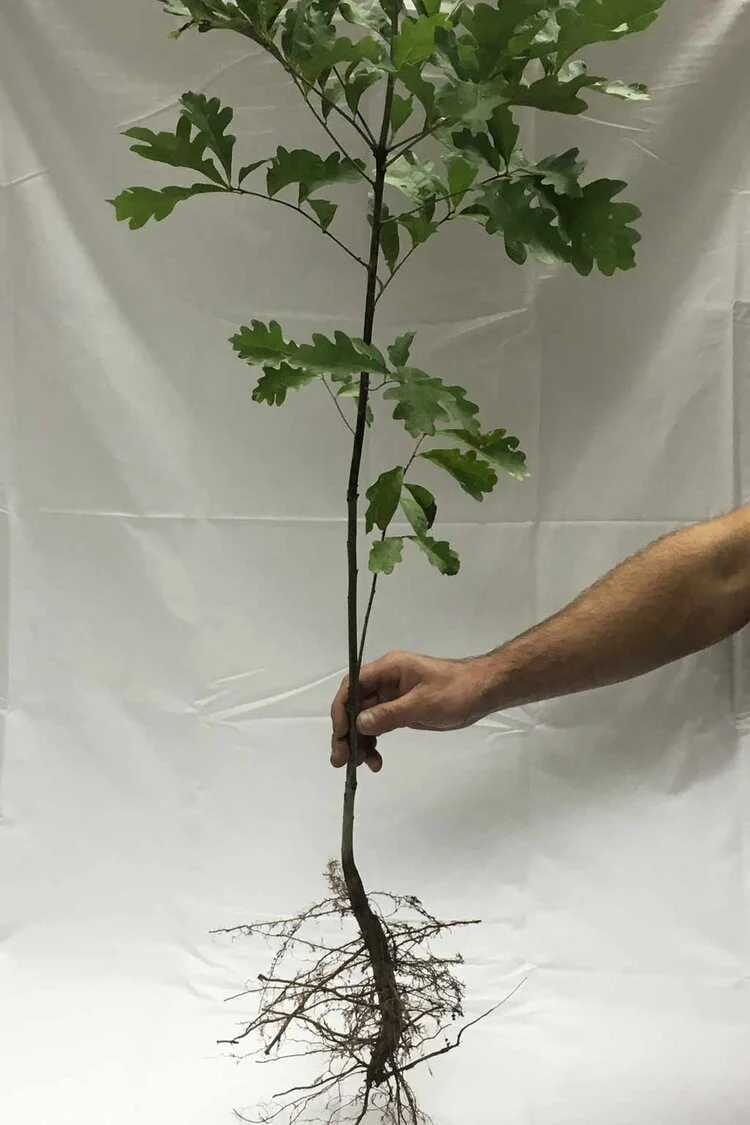Top Five Reasons We Root Prune
Root pruning is a practice in managing the size, shape and structure of a plant’s root system. This management of the roots is typically done through a mechanical means that prunes the roots to a specific size and shape. At Native Forest Nursery, we believe strongly that investing in this practice produces first-rate root systems on the nursery stock we supply to our customers.
These are the top five reasons why we root prune:
1. LATERAL ROOT DEVELOPMENT
A plant’s leaves produce a fixed amount of energy that the plant allocates to root development. Many species, when unmanaged, will allocate most of that energy to a single tap root that grows deep into the soil. Pruning this taproot at 6-8” at an early age forces the plant to allocate that same amount of energy to new lateral roots instead of a deep taproot, which produces a more fibrous root system.
2. MORE ROOTS IN THE PLANTING ZONE
When a plant’s tap root dominance is broken through root pruning, it forces the plant to produce more lateral roots and fine roots in the zone above the cut. This is the portion of the root system that ends up in the planting hole or container. Through root pruning, we have forced the plant to reallocate the portion of its root system that would have been below 8” and forced it put on that root mass in the zone above 8”.
2. MORE ROOTS IN THE PLANTING ZONE
When a plant’s tap root dominance is broken through root pruning, it forces the plant to produce more lateral roots and fine roots in the zone above the cut. This is the portion of the root system that ends up in the planting hole or container. Through root pruning, we have forced the plant to reallocate the portion of its root system that would have been below 8” and forced it put on that root mass in the zone above 8”.
3. UNIFORM ROOT SIZES
In addition to the biological benefits, the practice of root pruning also produces more uniform root systems for our customers. This eliminates the need for additional root pruning when the plants arrive at the tree planting job site, or at the nursery where they will be replanted in a field or container.
4. PROMOTING HEALTHY ROOTS
Pruning in general is a commonly used practice in the nursery industry to maintain and increase plant vigor. Root pruning is no exception. Pruning induces a stress on the plant that requires the plant to respond and grow stronger. Much like exercise does for the human body.
5. PROPER ROOT ARCHITECTURE
Root architecture is important for vigorous plant growth wherever a nursery-grown plant ends up. Pruning in the field creates a more fibrous root system that will perform well when put in a container for further growth. In containers, even a well-managed seedling root system is prone to root circling and root wrapping. By using air-pruning containers, Native Forest Nursery is able to prevent this circling and wrapping and maintain proper root structure and increase root volume.
At Native Forest Nursery, we produce over six million hardwood seedlings and over two million pine seedlings annually. We also produce over 200,000 container-grown plant annually. Our plants are made up of over a hundred different native species that are used for a variety of purposes. The important process of root pruning ensures that all of our nursery stock has the highest chance for successful transplanting. To see more about our root pruning processes, click here!



